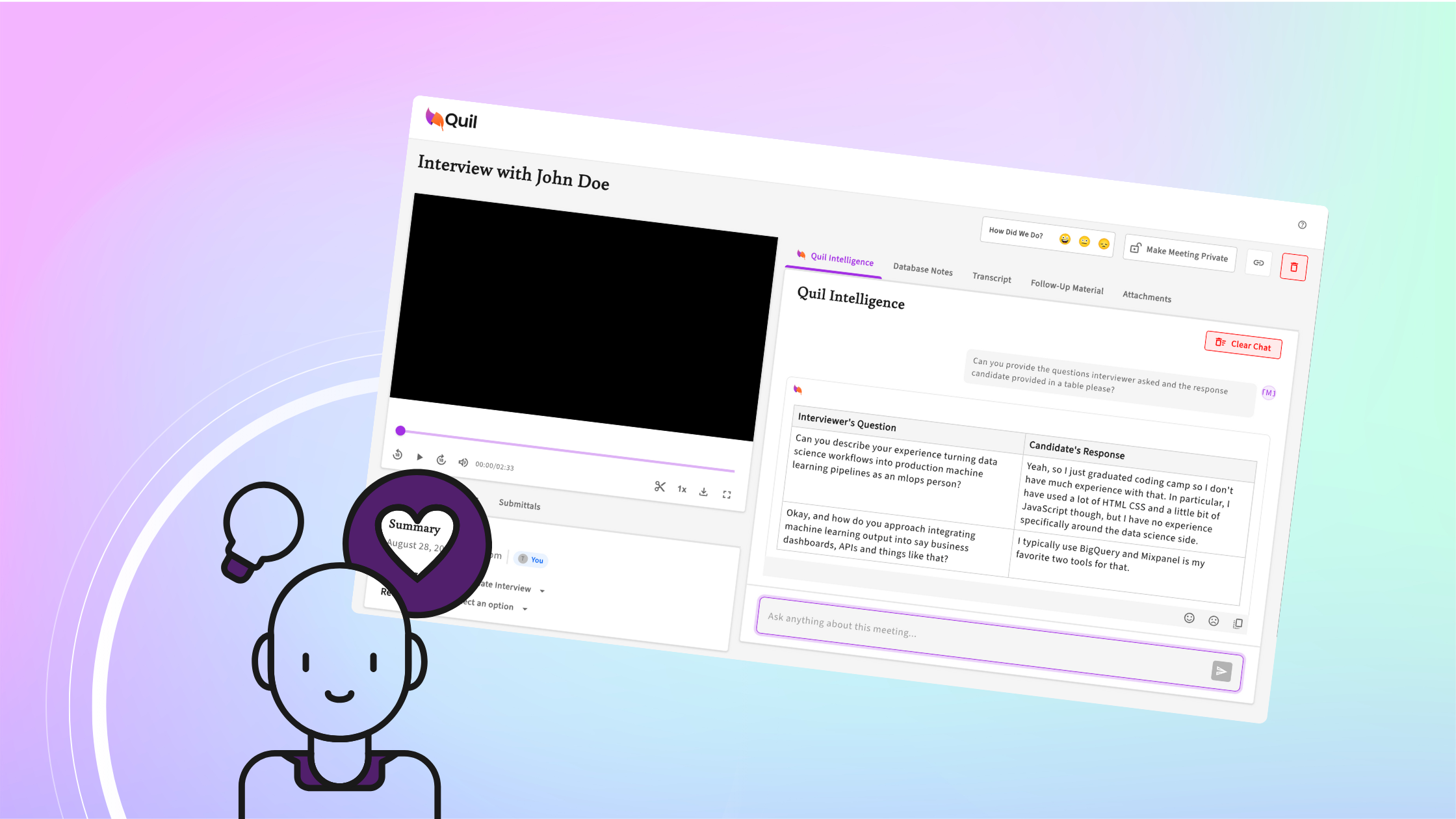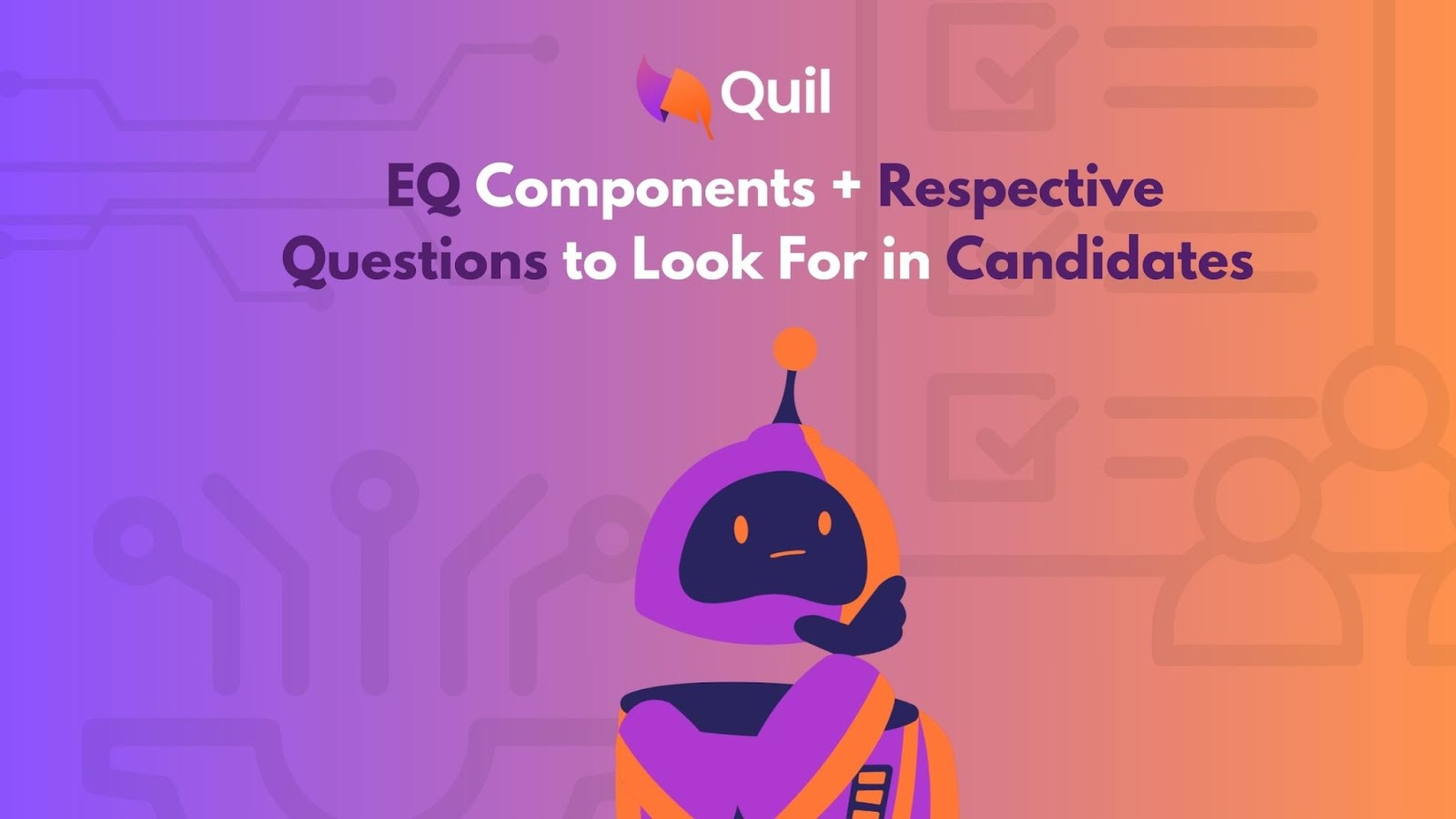

Hiring managers are always on the lookout for the “smartest” candidates i.e. candidates with a higher IQ. However, they tend to neglect one element that outperforms IQ at any given time: emotional intelligence aka EQ.
EQ is one element that most employees prefer over IQ. Plus, it’s a strong performance indicator.
That’s because people with a higher EQ tend to handle pressure more easily, deal with challenges, work well with others, and go on to become better leaders.
The question is, how do you find all these candidates with a higher EQ?
For starters, you can compile a list of questions to help with smarter hiring.
But we’ve done that for you.
Let’s address the elephant in the room: What is EQ, and why is it important for smarter hiring?
At its core, EQ, or emotional intelligence, is defined as the ability to deal with one’s own emotions. It’s a set of diverse emotions, like empathy, self-regulation, self-awareness, and more.
Plus, EQ is an integral part of helping see how an employee will perform. In fact, EQ alone explains 58% of an employee’s job performance.
So when employers say they prioritize EQ over IQ, they do it for a reason.
The only problem is how we assess it during interviews.
And that’s now a problem when you have a structured candidate onboarding process in place. A typical structure would look something like this:
You can tweak the structure to your specific needs, but this basic format helps you leap in the right direction.
We talked about how employees prefer candidates with a higher EQ but didn’t really address the why behind that approach.
What we have to understand is that emotional intelligence is more than just “people skills”.
It’s about recognizing, understanding, and managing emotions (both theirs and others) to build stronger teams, navigate tough situations, and adapt to change.
Here’s what a high-EQ hire actually brings to the table:
(P.S. These points also highlight the power of EQ-based questions in interviews.)
High-EQ candidates don’t just work well with others - they help create a positive, collaborative vibe.
They’re the ones who can sense when the team’s energy is off and know what’s needed to get things back in sync.
And Quil highlights specific points when you’re interviewing a candidate. You easily get to know how each candidate approaches teamwork.
When someone’s emotionally intelligent, they’re great at communicating.
They’re direct, thoughtful, and tuned in to others.
They’re less likely to send vague or abrupt messages and more likely to give feedback that’s constructive and clear.
Conflict is something that’s not avoidable.
But high-EQ candidates handle it with tact.
They know how to defuse the tension without letting things blow up. And that’s a trait every employer looks for (and something recruiters should also keep a lookout for).
Change is constant, and emotionally intelligent hires adapt fast.
And they’re the candidates you’re looking for. Being able to spot them becomes easier when you have useful AI recruiting tools to help with insights.
The best are empathetic, patient, and great at inspiring others.
They motivate. They inspire. And they’re inspired by others to improve.
And only a candidate with a good sense of EQ is able to do that. That’s what makes them natural leaders. And for that, you need to look at every little detail (which becomes easier when you use an AI notetaker 😉).

We touched upon some EQ components (think self-awareness) but didn’t really get into its nuances.
Let’s do that and look at some relevant questions that help decode that trait in candidates.
Self-aware candidates know who they are and what they bring to the table - both the good and the not-so-good.
They know their strengths and areas for growth (and employers love it when a candidate knows their capabilities) - which means they’re more likely to accept feedback and improve.
Plus, this component makes them stay grounded - something very important in high-stakes situations.
Here’s an example question you can ask:
"Tell me about a time you received constructive criticism. How did you handle it?"
And the answer you should expect would be something along these lines:
"My manager once pointed out that I could improve on my time management. I took it as a chance to reflect on my priorities, started using a task tracker, and now I make weekly plans to stay on top of deadlines."
Self-regulation is the ability to manage emotions, especially when things get tense.
So, when you’re interviewing candidates, actively listen and observe. Look at how they describe situations where they handled stress.
After all, you’d want to recruit a candidate who can think before they react and focus on solving the problem rather than blaming others.
Here’s an example question to ask:
"Describe a time when you had to keep your emotions in check to stay professional."
Bonus point: keep the questions open-ended (even if it's a long answer, you’ll have an AI meeting assistant to record everything!).
The answer should be something like this:
"During a client call, I received some unexpected criticism. I took a deep breath, stayed calm, and asked questions to understand their perspective. Later, I used their feedback to make the project even better."
Very basic, but you get the idea.
Highly motivated candidates have an internal drive to succeed (and that’s what makes them stick around - even through the rough patches).
Because they’re not just working for a paycheck- they’re working to make an impact, grow, and achieve.
Here’s one way to frame this component:
"What keeps you going, even on tough days?"
Here’s an example:
"When work gets hard, I remind myself why I started. I love seeing projects come together, especially when I know I’ve contributed something meaningful. It’s incredibly rewarding."
Good teamwork needs empathetic team members.
People who understand, respect, and connect with diverse perspectives.
Not people who are bonded to their selfish sentiments.
Candidates with this quality create an inclusive environment where everyone feels heard, and they naturally encourage collaboration and trust.
This is a tough quality to assess, so better to leave the question very open-ended. Example:
"How do you approach building rapport with new team members?"
"When meeting someone new, I make a point to ask about their interests and challenges. I try to find common ground and make them feel welcome. It’s about building trust from day one."
Again, these examples are just pointers. Your experience plus help from an AI notetaker (and its insights) will help you recruit the right person.
Befriending everyone isn’t a social skill.
It’s much more than that.
Candidates with social skills are great at communication. They’re eager to resolve conflicts, work well with different people (because not everyone has the same temperament), and bring their A-game forward.
They’re indispensable, especially in places where you need collaboration.
Let’s look at an example to help uncover this trait:
"Tell me about a time you helped resolve a misunderstanding between team members."
“Two teammates disagreed on project direction, so I brought them together to understand each perspective. I helped them find a compromise, and we moved forward as a stronger team."
But to help out with these components, you must get all the help you can.
And that’s where…
Quil’s AI notetaker captures every important detail during interviews, making it simple to keep track of each candidate's responses.
It identifies standout moments for each EQ trait, allowing you to tag specific answers that show a candidate’s self-awareness, empathy, or adaptability.
With ATS integration, all notes go directly into the system. This creates a record that has every little insight. It even generates candidate submittals to share with the entire hiring team.
You stay organized (without doing a lot of work) - a win-win situation.
As work environments grow more complex…
… and team dynamics become increasingly important to success, hiring for emotional intelligence is no longer just a “nice-to-have”.
You need it. Because those “nice-to-haves” are the candidates who bring a lot to the table - resilience, empathy, adaptability, collaboration, and so much more.
As a recruiter, your job is to hunt down candidates who have all these qualities - not just the hard skills.
That’s why Quil is designed to help identify these high-EQ candidates more easily.
Smarter hiring doesn’t mean spending hours on notes or manually updating your ATS - it means using a simple recruiting tool to help with all that and make impactful hiring decisions.
Quil is an AI notetaker for recruiters, automating the manual recruitment process for recruiters and large hiring agencies. It counters redundant admin tasks like note-taking during interviews and manually updating the Applicant Tracking System (ATS) post-interviews. Plus, it integrates with your favorite platforms like Zoho Recruit, Lever, Top Echelon, HubSpot, and Salesforce, making the entire hiring process feel like a breeze.